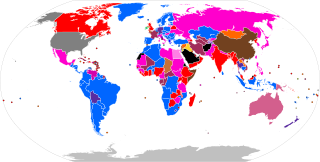 W
WThe American National Election Studies (ANES) are academically-run national surveys of voters in the United States, conducted before and after every presidential election. Though the ANES was formally established by a National Science Foundation grant in 1977, the data are a continuation of studies going back to 1948. The study has been based at the University of Michigan since its origin and, since 2005, has been run in partnership with Stanford University. Its principal investigators for the first four years of the partnership were Arthur Lupia and Jon Krosnick. As of 2017, the principal investigators are Ted Brader and Vincent Hutchings of the University of Michigan and Shanto Iyengar of Stanford University.
 W
WThe American Voter, published in 1960, is a seminal study of voting behavior in the United States, authored by Angus Campbell, Philip Converse, Warren Miller, and Donald E. Stokes, colleagues at the University of Michigan. Among its controversial conclusions, based on one of the first comprehensive studies of election survey data, is that most voters cast their ballots primarily on the basis of partisan identification, and that independent voters are actually the least involved in and attentive to politics. This theory of voter choice became known as the Michigan Model. It was later extended to the United Kingdom by David Butler and Donald Stokes in Political change in Britain.
 W
WThe Bradley effect is a theory concerning observed discrepancies between voter opinion polls and election outcomes in some United States government elections where a white candidate and a non-white candidate run against each other. The theory proposes that some white voters who intend to vote for the white candidate would nonetheless tell pollsters that they are undecided or likely to vote for the non-white candidate. It was named after Los Angeles Mayor Tom Bradley, an African-American who lost the 1982 California governor's race despite being ahead in voter polls going into the elections.
 W
WCardinal voting refers to any electoral system which allows the voter to give each candidate an independent evaluation, typically a rating or grade. These are also referred to as "rated", "evaluative", "graded", or "absolute" voting systems. Cardinal methods and ordinal methods are two main categories of modern voting systems, along with plurality voting.
 W
WIn political science and sociology, a cleavage is a historically determined social or cultural line which divides citizens within a society into groups with differing political interests, resulting in political conflict among these groups. Social or cultural cleavages thus become political cleavages once they get politicized as such. Cleavage theory accordingly argues that political cleavages predominantly determine a country's party system as well as the individual voting behavior of citizens, dividing them into voting blocs. It is distinct from other common political theories on voting behavior in the sense that it focuses on aggregate and structural patterns instead of individual voting behaviors.
 W
WThe Cook Partisan Voting Index is a measurement of how strongly a United States congressional district or state leans toward the Democratic or Republican Party, compared to the nation as a whole, based on how that district or state voted in the previous two Presidential elections.
 W
WAn electoral system or voting system is a set of rules that determine how elections and referendums are conducted and how their results are determined. Political electoral systems are organized by governments, while non-political elections may take place in business, non-profit organisations and informal organisations. These rules govern all aspects of the voting process: when elections occur, who is allowed to vote, who can stand as a candidate, how ballots are marked and cast, how the ballots are counted, how votes translate into the election outcome, limits on campaign spending, and other factors that can affect the result. Political electoral systems are defined by constitutions and electoral laws, are typically conducted by election commissions, and can use multiple types of elections for different offices.
 W
WThe Gallagher index is a statistical analysis methodology utilised within political science which "measures an electoral system’s relative disproportionality between votes received and seats allotted in a legislature." As such, it measures the difference between the percentage of votes each party gets and the percentage of seats each party gets in the resulting legislature, and it also measures this disproportionality from all parties collectively in any one given election. That collective disproportionality from the election is given a precise score, which can then be used in comparing various levels of proportionality among various elections from various electoral systems.
 W
WThe Missouri bellwether is a political phenomenon that notes that the state of Missouri voted for the winner in all but one U.S. presidential election from 1904 to 2004. While states like Pennsylvania, Nevada, Florida and Wisconsin have been arguably stronger indicators of political trends in recent years, Missouri was a consistent swing state throughout the 20th century. Prior to the 2008 elections, Lincoln County, Missouri was said to be the only bellwether county in a bellwether state. Missouri was also considered a bellwether of U.S. views on hot-button social issues such as stem cell research and school vouchers. Some economists also considered the state a bellwether for economic trends such as consumer confidence and unemployment.
 W
WPsephos: Adam Carr's Electoral Archive is an online archive of election statistics, and claims to be the world's largest online resource of such information. Psephos is maintained by Dr Adam Carr, of Melbourne, Australia, a historian and former aide to Australian MP Michael Danby and Senator David Feeney. It includes detailed statistics for presidential and legislative elections from 182 countries, with at least some statistics for every country that has what Carr considers to be genuine national elections.
 W
W"The quiet Australians" is an expression that was used by Australian politician Scott Morrison when his Liberal/National Coalition unexpectedly won the 2019 Australian federal election on 18 May 2019. Describing the outcome as a miracle, Morrison stated that "the quiet Australians ... have won a great victory":This is, this is the best country in the world in which to live. It is those Australians that we have been working for, for the last five and a half years since we came to Government, under Tony Abbott's leadership back in 2013. It has been those Australians who have worked hard every day, they have their dreams, they have their aspirations; to get a job, to get an apprenticeship, to start a business, to meet someone amazing. To start a family, to buy a home, to work hard and provide the best you can for your kids. To save your retirement and to ensure that when you're in your retirement, that you can enjoy it because you've worked hard for it. These are the quiet Australians who have won a great victory tonight.
 W
WThe shy Tory factor is a name given by British opinion polling companies to a phenomenon first observed by psephologists in the early 1990s. They observed that the share of the electoral vote won by the Conservative Party was significantly higher than the equivalent share in opinion polls. The accepted explanation was that so-called "shy Tories" were voting Conservative after telling pollsters they would not. The general elections held in 1992 and 2015 are examples where it has dramatically affected the overall result, but has also been discussed in other elections where the Conservatives did unexpectedly well. It has also been applied to the success of the Republican Party in the United States or the continued electoral victories of the People's Action Party in Singapore.
 W
WIn American politics, the term swing state refers to any state that could reasonably be won by either the Democratic or Republican presidential candidate by a swing in votes. These states are usually targeted by both major-party campaigns, especially in competitive elections. Meanwhile, the states that regularly lean to a single party are known as safe states, as it is generally assumed that one candidate has a base of support from which they can draw a sufficient share of the electorate without significant investment or effort by their campaign.